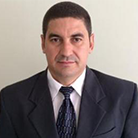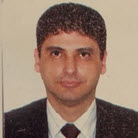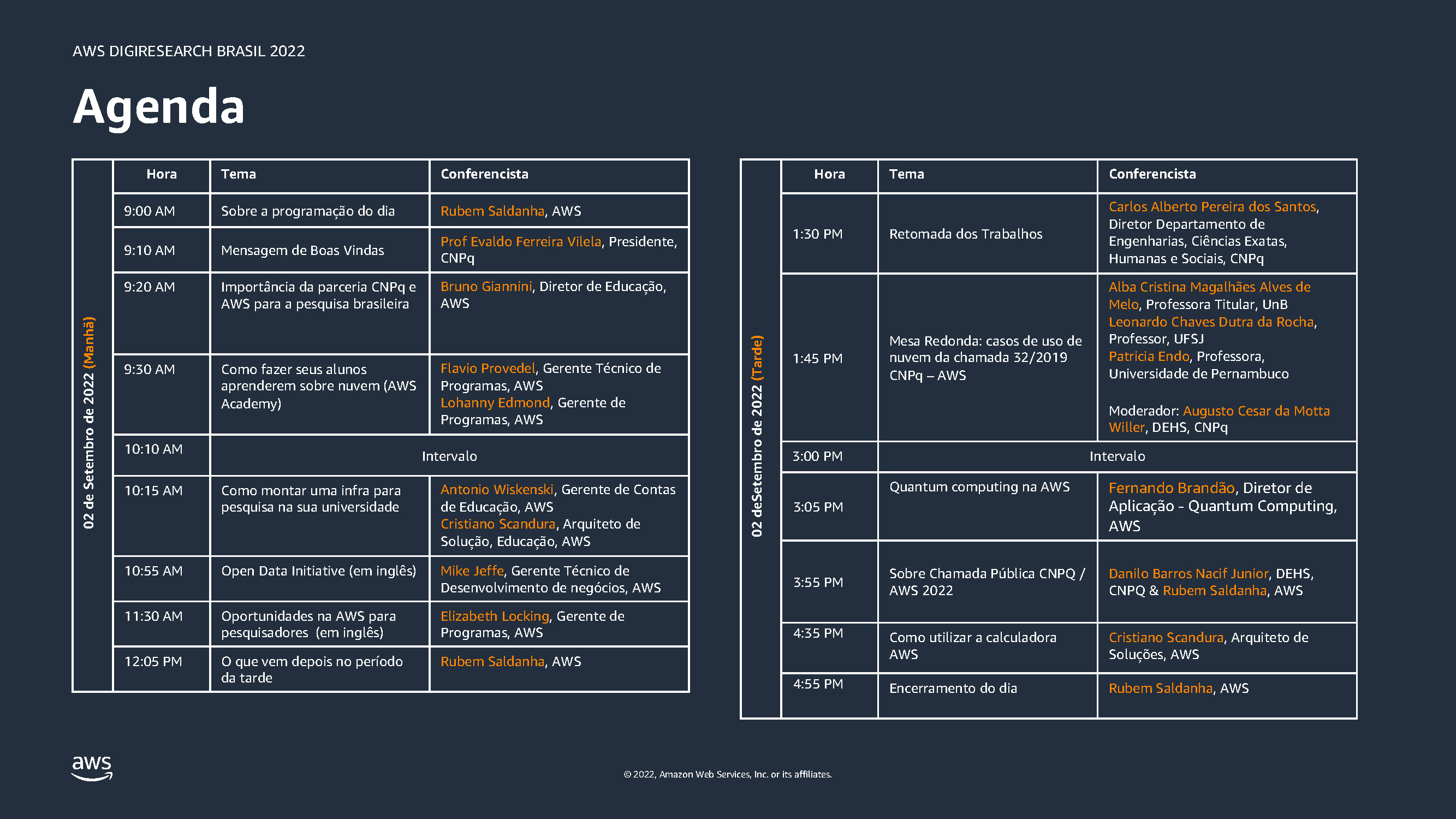Temporibus Autem Quibusdam et Aut Debitis Necessitatibus Nam
Descrição do evento:
Quem deve participar:
Palestrantes:
Session Details
- Track1 Session 1
- Track2 Session 1
- Track3 Session 1
- Track4 Session 1
- Track5 Session 1
- Track6 Session 1
- Track7 Session 1
- Track8 Session 1
- Track9 Session 1
- Track10 Session 1
Track1 Session 1
Migrate your Oracle and SQL Server databases to
Organizations today are looking to free themselves from the constraints of on-premises databases and leverage the power of fully managed databases in the cloud. Amazon RDS is a fully managed relational database service that you can use to run your choice of database engines including open source engines, Oracle, and SQL Server in the cloud. Amazon RDS automates time-consuming database administration tasks and adds capabilities such as replication and Multi-AZ failover to make your database deployments more scalable, available, reliable, manageable, and cost-effective. This session covers why you should consider moving your on-premises Oracle & SQL Server deployments to Amazon RDS and the tools to get started.
Track2 Session 1
Migrate your Oracle and SQL Server databases to
Organizations today are looking to free themselves from the constraints of on-premises databases and leverage the power of fully managed databases in the cloud. Amazon RDS is a fully managed relational database service that you can use to run your choice of database engines including open source engines, Oracle, and SQL Server in the cloud. Amazon RDS automates time-consuming database administration tasks and adds capabilities such as replication and Multi-AZ failover to make your database deployments more scalable, available, reliable, manageable, and cost-effective. This session covers why you should consider moving your on-premises Oracle & SQL Server deployments to Amazon RDS and the tools to get started.
Track3 Session 1
Tab 3 content
Nulla eleifend felis vitae velit tristique imperdiet. Etiam nec imperdiet elit. Pellentesque sem lorem, scelerisque sed facilisis sed, vestibulum sit amet eros.
Track4 Session 1
Tab 4 content
Integer ultrices lacus sit amet lorem viverra consequat. Vivamus lacinia interdum sapien non faucibus. Maecenas bibendum, lectus at ultrices viverra, elit magna egestas magna, a adipiscing mauris justo nec eros.
Track5 Session 1
Tab 5 content
Nulla eleifend felis vitae velit tristique imperdiet. Etiam nec imperdiet elit. Pellentesque sem lorem, scelerisque sed facilisis sed, vestibulum sit amet eros.
Track6 Session 1
Tab 6 content
Integer ultrices lacus sit amet lorem viverra consequat. Vivamus lacinia interdum sapien non faucibus. Maecenas bibendum, lectus at ultrices viverra, elit magna egestas magna, a adipiscing mauris justo nec eros.
Track7 Session 1
Tab 7 content
Organizations today are looking to free themselves from the constraints of on-premises databases and leverage the power of fully managed databases in the cloud. Amazon RDS is a fully managed relational database service that you can use to run your choice of database engines including open source engines, Oracle, and SQL Server in the cloud. Amazon RDS automates time-consuming database administration tasks and adds capabilities such as replication and Multi-AZ failover to make your database deployments more scalable, available, reliable, manageable, and cost-effective. This session covers why you should consider moving your on-premises Oracle & SQL Server deployments to Amazon RDS and the tools to get started.
Track8 Session 1
Tab 8 content
Organizations today are looking to free themselves from the constraints of on-premises databases and leverage the power of fully managed databases in the cloud. Amazon RDS is a fully managed relational database service that you can use to run your choice of database engines including open source engines, Oracle, and SQL Server in the cloud. Amazon RDS automates time-consuming database administration tasks and adds capabilities such as replication and Multi-AZ failover to make your database deployments more scalable, available, reliable, manageable, and cost-effective. This session covers why you should consider moving your on-premises Oracle & SQL Server deployments to Amazon RDS and the tools to get started.
Track9 Session 1
Tab 9 content
Organizations today are looking to free themselves from the constraints of on-premises databases and leverage the power of fully managed databases in the cloud. Amazon RDS is a fully managed relational database service that you can use to run your choice of database engines including open source engines, Oracle, and SQL Server in the cloud. Amazon RDS automates time-consuming database administration tasks and adds capabilities such as replication and Multi-AZ failover to make your database deployments more scalable, available, reliable, manageable, and cost-effective. This session covers why you should consider moving your on-premises Oracle & SQL Server deployments to Amazon RDS and the tools to get started.
Track10 Session 1
Tab 10 content
Organizations today are looking to free themselves from the constraints of on-premises databases and leverage the power of fully managed databases in the cloud. Amazon RDS is a fully managed relational database service that you can use to run your choice of database engines including open source engines, Oracle, and SQL Server in the cloud. Amazon RDS automates time-consuming database administration tasks and adds capabilities such as replication and Multi-AZ failover to make your database deployments more scalable, available, reliable, manageable, and cost-effective. This session covers why you should consider moving your on-premises Oracle & SQL Server deployments to Amazon RDS and the tools to get started.
Multiple City Registration
-
JAN 21 2020Sunt in Culpa

-
JAN 21 2020Sunt in Culpa

-
JAN 21 2020Sunt in Culpa

-
JAN 21 2020Sunt in Culpa

-
JAN 21 2020Sunt in Culpa

-
JAN 21 2020Sunt in Culpa

-
JAN 21 2020Sunt in Culpa

-
JAN 21 2020Sunt in Culpa

-
JAN 21 2020Sunt in Culpa

-
JAN 21 2020Sunt in Culpa

-
JAN 21 2020Sunt in Culpa

-
JAN 21 2020Sunt in Culpa

-
JAN 21 2020Sunt in Culpa

-
JAN 21 2020Sunt in Culpa

-
JAN 21 2020Sunt in Culpa

Sessions will focus on providing an overview of AWS services and features, with the assumption that attendees are new to the topic Sessions will focus on providing an overview of AWS services and features, with the assumption that attendees are new to the topic Sessions will focus on providing an overview of AWS services and features, with the assumption that attendees are new to the topic Sessions will focus on providing an overview of AWS services and features, with the assumption that attendees are new to the topic
Session Proficiency Levels Explained
-
Level 100
Introductory
Sessions will focus on providing an overview of AWS services and features, with the assumption that attendees are new to the topic
-
Level 200
Intermediate
Sessions will focus on providing best practices, details of service features and demos with the assumption that attendees have introductory knowledge of the topics
-
Level 300
Advanced
Sessions will dive deeper into the selected topic. Presenters assume that the audience has some familiarity with the topic, but may or may not have direct experience implementing a similar solution
-
Level 400
Expert
Sessions are for attendees who are deeply familiar with the topic, have implemented a solution on their own already, and are comfortable with how the technology works across multiple services, architectures, and implementations
Descrição do evento:
Quem deve participar:
Quis Nostrud Exercitation
Lorem ipsum dolor sit amet, consectetur adipiscing elit, sed do eiusmod tempor incididunt ut labore et dolore magna aliqua. Ut enim ad minim veniam, quis nostrud exercitation ullamco laboris nisi ut aliquip ex ea commodo consequat.
Duis aute irure dolor in reprehenderit in voluptate velit esse cillum dolore eu fugiat nulla pariatur. Excepteur sint occaecat cupidatat non proident, sunt in culpa qui officia deserunt mollit anim id est. laborum.
Excepteur Sint
Lorem ipsum dolor sit amet, elit, sed do ut labore et dolore magna aliqua. Ut enim ad minim veniam, quis nostrud exercitation ullamco laboris nisi ut aliquip ex eaconsequat. Duis aute irure dolor in.
Palestrantes:
-

Evaldo Ferreira Vilela
Presidente | CNPq
Evaldo Ferreira Vilela é um cientista brasileiro que estuda agronomia, entomologia, feromônios e comportamento de insetos, controle biológico e ecologia química. Foi reitor da Universidade Federal de Viçosa entre 2000 e 2004 e presidente da Fundação de Amparo à Pesquisa do Estado de Minas Gerais. É membro titular da Academia Brasileira de Ciências desde 2012.
Em abril de 2020, Evaldo se tornou presidente do Conselho Nacional de Desenvolvimento Científico e Tecnológico, cargo que ocupa até os dias de hoje.
-

Carlos Alberto Pereira dos Santos
Diretor Departamento de Engenharias, Ciências Exatas, Humanas e Sociais | CNPq
Possui graduação em Matemática pela Universidade Federal de Goiás (1994), mestrado em Matemática pela Universidade de Brasília (1997), doutorado em Matemática pela Universidade de Brasília (2003) e Pós-doutorado na Rutguers University em New Jersey-US, sob a supervisao do Professor Häim Brezis (2016). É Professor Associado IV da Universidade de Brasília. Tem experiência na área de Matemática com ênfase em Análise Funcional Não-Linear e Equações Diferencias Elipticas atuando principalmente nos seguintes temas: Problemas com não-linearidades Singulares, Problemas com Soluções Singulares e Equações de Schrödinger.
-

Alba Cristina Magalhães Alves de Melo
Professora Titular | UnB
Prof. Alba Cristina Magalhaes Alves de Melo possui Graduação em Processamento de Dados pela UnB (1986), Mestrado em Ciência da Computação pela UFRGS (1991) e Doutorado em Informática pelo Institut National Polytechnique de Grenoble (INPG), França (1996). Desde 1997, ela é professora do Departamento de Ciência da Computação da UnB, onde é atualmente Professora Titular. Prof. Alba é também Bolsista PQ nível 1C, Senior Member da IEEE Society, Delegate do Working Group in ICT-HPC do BRICS (Brazil, Russia, India, China and South Africa) e Conselheira da Sociedade Brasileira de Computação. A Prof. Alba é Membro do Corpo Editorial de periódicos internacionais de prestígio e possui colaborações com grupos de pesquisa internacionais (Canadá, Espanha, França, Dinamarca, Itália, Alemanha e Chile) e nacionais (UFF, UERJ, USP, UFPEL, FIOCRUZ, LNCC, dentre outros). Orientou 8 Teses de Doutorado e 24 Dissertações de Mestrado, sendo que uma das Teses de Doutorado sob sua orientação recebeu o Prêmio Capes de Tese da área de Ciência da Computação em 2016. Seus interesses de pesquisa incluem: Computação de Alto Desempenho, Bioinformática e Computação em Nuvem.
-

Leonardo Chaves Dutra da Rocha
Professor | UFSJ
Possui graduação em Ciência da Computação pela Universidade Federal de Minas Gerais (2003) e mestrado em CIência da Computação pela Universidade Federal de Minas Gerais (2005). Doutor em Ciência da Computação também formado na Universidade Federal de Minas Gerais (2009). Tem experiência na área de Ciência da Computação, com ênfase em planejamento de capacidade, mineração de dados, banco de dados e recuperação de informação.
-

Augusto Cesar da Motta Willer
Analista do Programa de Pesquisa em Engenharia (COENG - DEHS) | CNPq
Bacharel em Ciências Biológicas pela Universidade de Brasília (1997), Licenciado em Química pela Universidade de Brasília (2005), Especialista em Gestão Financeira e Mercado de Capitais (2008) e Especialista em Gestão Estratégia de Organizações Públicas (2011) . Foi professor de Ensino Médio entre 1998 a 2009, atuando nas disciplinas de Biologia e Química. Foi professor universitário entre 1999 e 2009, atuando nas áreas de Biologia Celular, Bioestatística, Genética, Farmacologia, Epidemiologia, Bioquímica, Microbiologia e Saúde Pública. Foi Analista OPAS/OMS atuando no Departamento de Ciência e Tecnologia (DECIT) do Ministério da Saúde. Atualmente é Servidor Público Federal com o cargo de Analista de Ciência e Tecnologia do Conselho Nacional de Desenvolvimento Científico e Tecnológico - CNPq desde 2012. Atualmente é Analista Técnico da Coordenação do Programa de Pesquisa em Engenharia - COENG/CGETS/DEHS/CNPq.
-

Danilo Barros Nacif Junior
Analista do Programa de Pesquisa em Engenharia (COENG – DEHS) | CNPq
Possui graduação em Engenharia Elétrica pela Universidade de Brasília(1989) e mestrado em Engenharia Elétrica pela Universidade de Brasília(1993). Atualmente é Servidor Público do Conselho Nacional de Desenvolvimento Científico e Tecnológico. Atuando principalmente nos seguintes temas:Microondas, Misturadores, Ondas Milimétricas.
-

Patricia Takako Endo
Professora Associada | UPE
Patricia Takako Endo é atualmente Professora Associada da Universidade de Pernambuco. Obteve seu doutorado em Ciência da Computação, pela Universidade Federal de Pernambuco (UFPE) e realizou seu pós-doutorado na Dublin City University (DCU), Irlanda. É pesquisadora líder do grupo de pesquisa dotLAB Brazil e gerente de pesquisa no Grupo de Pesquisa em Redes de Computadores e Telecomunicações (GPRT).
-

Britt Allen
Gerente Senior Programa Amazon Scholars | AWS
-

Richard Boyd, Cloud Data Engineer, iRobot
Richard Boyd is a cloud data engineer with the iRobot Corporation’s Cloud Data Platform where he builds tools and services to support the world’s most beloved vacuum cleaner. Before joining iRobot, Richard built discrete event simulators for Amazon’s automated fulfillment centers in Amazon Robotics. His previous roles include cyber warfare systems analyst at MIT and research for the Center for Army Analysis. He holds advanced degrees in Applied Mathematics & Statistics.
-

Raju Gulabani, VP of Databases, Analytics & AI, AWS
Raju Gulabani is VP of Databases, Analytics & AI within AWS at Amazon.com. He is responsible for P&<, product management, engineering and operations for Database services such as Amazon Aurora and Amazon DynamoDB, and Analytics services such as Amazon Redshift and Amazon EMR, as well as AI services like Amazon Lex, Amazon Polly, and Amazon Rekognition. Prior to joining Amazon in his current position in 2010, Raju spent four years at Google and built the Google Apps business (now known as G Suite).Earlier in his career, Raju founded an Intel backed Wi-Fi Voice over IP company as well as held engineering management positions at Microsoft.
-

Ryan Kelly, Data Architect, Equinox
Ryan Kelly is a data architect at Equinox, where he helps outline and implement frameworks for data initiatives. He also leads clickstream tracking which helps aid teams with insights on their digital initiatives. Ryan loves making it easier for people to reach and ingest their data for the purposes of business intelligence, analytics, and product/service enrichment. He also loves exploring and vetting new technologies to see how they can enhance what they do at Equinox
-

Richard Boyd, Cloud Data Engineer, iRobot
Richard Boyd is a cloud data engineer with the iRobot Corporation’s Cloud Data Platform where he builds tools and services to support the world’s most beloved vacuum cleaner. Before joining iRobot, Richard built discrete event simulators for Amazon’s automated fulfillment centers in Amazon Robotics. His previous roles include cyber warfare systems analyst at MIT and research for the Center for Army Analysis. He holds advanced degrees in Applied Mathematics & Statistics.
Customer Highlights

Epics Games’ entire analytics platform runs on AWS. Billions of game events, like player interactions on the map, their accuracy, damage taken and dealt, and what resources they are using are all sent to AWS.

Epics Games’ entire analytics platform runs on AWS. Billions of game events, like player interactions on the map, their accuracy, damage taken and dealt, and what resources they are using are all sent to AWS.

Epics Games’ entire analytics platform runs on AWS. Billions of game events, like player interactions on the map, their accuracy, damage taken and dealt, and what resources they are using are all sent to AWS.

Epics Games’ entire analytics platform runs on AWS. Billions of game events, like player interactions on the map, their accuracy, damage taken and dealt, and what resources they are using are all sent to AWS.
FAQS
- Where is AWS Innovate hosted?
- What is the price of attending AWS Innovate?
- Who should attend AWS Innovate?
- How do I get the certificate of attendance?
Q: Where is this event?
A: This event is an online event, hosted by AWS on the INXPO platform.
Q: Who should attend this event?
A: Developers building data-driven apps; DBAs and data engineers who are building analytics infrastructure and data pipelines; Analysts and data scientists who are deriving insights that answer complex business quesions and building/trainining machine learning models.
Q: How much does this event cost?
A: There is no cost to attend this event.
Q: What are the prerequisites before attending the event?
A: There are no prerequisites for attending the event. We encourage attendees to browse the Database and Analytics pages on the AWS website to get a brief overview of the services available to them.

